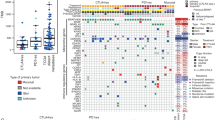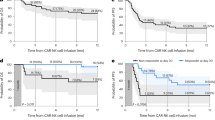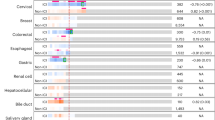Abstract
Blockade of immune checkpoints is emerging as a new form of anticancer therapy. We studied the expression of programmed death ligand 1 (PD-L1), PD-L2, programmed death 1 (PD-1) and cytotoxic T lymphocyte-associated antigen 4 (CTLA4) mRNA in CD34+ cells from myelodysplastic syndrome (MDS), chronic myelomonocytic leukemia (CMML) and acute myeloid leukemia (AML) patients (N=124). Aberrant upregulation (⩾2-fold) was observed in 34, 14, 15 and 8% of the patients. Increased expression of these four genes was also observed in peripheral blood mononuclear cells (PBMNCs) (N=61). The relative expression of PD-L1 from PBMNC was significantly higher in MDS (P=0.018) and CMML (P=0.0128) compared with AML. By immunohistochemical analysis, PD-L1 protein expression was observed in MDS CD34+ cells, whereas stroma/non-blast cellular compartment was positive for PD-1. In a cohort of patients treated with epigenetic therapy, PD-L1, PD-L2, PD-1 and CTLA4 expression was upregulated. Patients resistant to therapy had relative higher increments in gene expression compared with patients who achieved response. Treatment of leukemia cells with decitabine resulted in a dose-dependent upregulation of above genes. Exposure to decitabine resulted in partial demethylation of PD-1 in leukemia cell lines and human samples. This study suggests that PD-1 signaling may be involved in MDS pathogenesis and resistance mechanisms to hypomethylating agents. Blockade of this pathway can be a potential therapy in MDS and AML.
This is a preview of subscription content, access via your institution
Access options
Subscribe to this journal
Receive 12 print issues and online access
$259.00 per year
only $21.58 per issue
Buy this article
- Purchase on Springer Link
- Instant access to full article PDF
Prices may be subject to local taxes which are calculated during checkout





Similar content being viewed by others
References
Nimer SD . Myelodysplastic syndromes. Blood 2008; 111: 4841–4851.
Bejar R, Stevenson K, Abdel-Wahab O, Galili N, Nilsson B, Garcia-Manero G et al. Clinical effect of point mutations in myelodysplastic syndromes. New Engl J Med 2011; 364: 2496–2506.
Warlick ED, Miller JS . Myelodysplastic syndromes: the role of the immune system in pathogenesis. Leuk Lymphoma 2011; 52: 2045–2049.
Wei Y, Chen R, Dimicoli S, Bueso-Ramos C, Neuberg D, Pierce S et al. Global H3K4me3 genome mapping reveals alterations of innate immunity signaling and overexpression of JMJD3 in human myelodysplastic syndrome CD34+ cells. Leukemia 2013; 27: 2177–2186.
Kiladjian JJ, Bourgeois E, Lobe I, Braun T, Visentin G, Bourhis JH et al. Cytolytic function and survival of natural killer cells are severely altered in myelodysplastic syndromes. Leukemia 2006; 20: 463–470.
Epling-Burnette PK, Painter JS, Rollison DE, Ku E, Vendron D, Widen R et al. Prevalence and clinical association of clonal T-cell expansions in myelodysplastic syndrome. Leukemia 2007; 21: 659–667.
Kordasti SY, Ingram W, Hayden J, Darling D, Barber L, Afzali B et al. CD4+CD25high Foxp3+ regulatory T cells in myelodysplastic syndrome (MDS). Blood 2007; 110: 847–850.
Hamdi W, Ogawara H, Handa H, Tsukamoto N, Nojima Y, Murakami H . Clinical significance of regulatory T cells in patients with myelodysplastic syndrome. Eur J Haematol 2009; 82: 201–207.
Gabrilovich DI, Nagaraj S . Myeloid-derived suppressor cells as regulators of the immune system. Nat Rev Immunol 2009; 9: 162–174.
Anguille S, Lion E, Smits E, Berneman ZN, van Tendeloo VF . Dendritic cell vaccine therapy for acute myeloid leukemia: questions and answers. Hum Vaccin 2011; 7: 579–584.
Anguille S, Lion E, Willemen Y, Van Tendeloo VF, Berneman ZN, Smits EL . Interferon-alpha in acute myeloid leukemia: an old drug revisited. Leukemia 2011; 25: 739–748.
Anguille S, Van Tendeloo VF, Berneman ZN . Leukemia-associated antigens and their relevance to the immunotherapy of acute myeloid leukemia. Leukemia 2012; 26: 2186–2196.
Maywald O, Buchheidt D, Bergmann J, Schoch C, Ludwig WD, Reiter A et al. Spontaneous remission in adult acute myeloid leukemia in association with systemic bacterial infection-case report and review of the literature. Ann Hematol 2004; 83: 189–194.
Tefferi A, Vardiman JW . Myelodysplastic syndromes. New Engl J Med 2009; 361: 1872–1885.
Sharma P, Wagner K, Wolchok JD, Allison JP . Novel cancer immunotherapy agents with survival benefit: recent successes and next steps. Nat Rev Cancer 2011; 11: 805–812.
Zou W, Chen L . Inhibitory B7-family molecules in the tumour microenvironment. Nat Rev Immunol 2008; 8: 467–477.
Topalian SL, Hodi FS, Brahmer JR, Gettinger SN, Smith DC, McDermott DF et al. Safety, activity, and immune correlates of anti-PD-1 antibody in cancer. New Engl J Med 2012; 366: 2443–2454.
Fenaux P, Mufti GJ, Hellstrom-Lindberg E, Santini V, Finelli C, Giagounidis A et al. Efficacy of azacitidine compared with that of conventional care regimens in the treatment of higher-risk myelodysplastic syndromes: a randomised, open-label, phase III study. Lancet Oncol 2009; 10: 223–232.
Kantarjian HM, Thomas XG, Dmoszynska A, Wierzbowska A, Mazur G, Mayer J et al. Multicenter, randomized, open-label, phase III trial of decitabine versus patient choice, with physician advice, of either supportive care or low-dose cytarabine for the treatment of older patients with newly diagnosed acute myeloid leukemia. J Clin Oncol 2012; 30: 2670–2677.
Kantarjian H, Issa JP, Rosenfeld CS, Bennett JM, Albitar M, DiPersio J et al. Decitabine improves patient outcomes in myelodysplastic syndromes: results of a phase III randomized study. Cancer 2006; 106: 1794–1803.
Jabbour E, Garcia-Manero G, Batty N, Shan J, O'Brien S, Cortes J et al. Outcome of patients with myelodysplastic syndrome after failure of decitabine therapy. Cancer 2010; 116: 3830–3834.
Bontkes HJ, Ruben JM, Alhan C, Westers TM, Ossenkoppele GJ, van de Loosdrecht AA . Azacitidine differentially affects CD4(pos) T-cell polarization in vitro and in vivo in high risk myelodysplastic syndromes. Leuk Res 2012; 36: 921–930.
McDaniel JM, Pinilla-Ibarz J, Epling-Burnette PK . Molecular action of lenalidomide in lymphocytes and hematologic malignancies. Adv Hematol 2012; 2012: 513702.
Youngblood B, Oestreich KJ, Ha SJ, Duraiswamy J, Akondy RS, West EE et al. Chronic virus infection enforces demethylation of the locus that encodes PD-1 in antigen-specific CD8(+) T cells. Immunity 2011; 35: 400–412.
Soriano AO, Yang H, Faderl S, Estrov Z, Giles F, Ravandi F et al. Safety and clinical activity of the combination of 5-azacytidine, valproic acid, and all-trans retinoic acid in acute myeloid leukemia and myelodysplastic syndrome. Blood 2007; 110: 2302–2308.
Greenberg P, Cox C, LeBeau MM, Fenaux P, Morel P, Sanz G et al. International scoring system for evaluating prognosis in myelodysplastic syndromes. Blood 1997; 89: 2079–2088.
Garcia-Manero G, Jabbour E, Borthakur G, Faderl S, Estrov Z, Yang H et al. Randomized open-label phase II study of decitabine in patients with low- or intermediate-risk myelodysplastic syndromes. J Clin Oncol 2013; 31: 2548–2553.
Keir ME, Butte MJ, Freeman GJ, Sharpe AH . PD-1 and its ligands in tolerance and immunity. Annu Rev Immunol 2008; 26: 677–704.
Sugimori C, List AF, Epling-Burnette PK . Immune dysregulation in myelodysplastic syndrome. Hematol Rep 2010; 2: e1.
Olnes MJ, Sloand EM . Targeting immune dysregulation in myelodysplastic syndromes. JAMA 2011; 305: 814–819.
Bouchliou I, Miltiades P, Nakou E, Spanoudakis E, Goutzouvelidis A, Vakalopoulou S et al. Th17 and Foxp3(+) T regulatory cell dynamics and distribution in myelodysplastic syndromes. Clin Immunol 2011; 139: 350–359.
Taube JM, Anders RA, Young GD, Xu H, Sharma R, McMiller TL et al. Colocalization of inflammatory response with B7-h1 expression in human melanocytic lesions supports an adaptive resistance mechanism of immune escape. Sci Transl Med 2012; 4: 127ra137.
Karim R, Jordanova ES, Piersma SJ, Kenter GG, Chen L, Boer JM et al. Tumor-expressed B7-H1 and B7-DC in relation to PD-1+ T-cell infiltration and survival of patients with cervical carcinoma. Clin Cancer Res 2009; 15: 6341–6347.
Zeng Z, Shi F, Zhou L, Zhang MN, Chen Y, Chang XJ et al. Upregulation of circulating PD-L1/PD-1 is associated with poor post-cryoablation prognosis in patients with HBV-related hepatocellular carcinoma. PLoS One 2011; 6: e23621.
Freeman GJ, Long AJ, Iwai Y, Bourque K, Chernova T, Nishimura H et al. Engagement of the PD-1 immunoinhibitory receptor by a novel B7 family member leads to negative regulation of lymphocyte activation. J Exp Med 2000; 192: 1027–1034.
Kadia TM, Jabbour E, Kantarjian H . Failure of hypomethylating agent-based therapy in myelodysplastic syndromes. Semin Oncol 2011; 38: 682–692.
Fonsatti E, Nicolay HJ, Sigalotti L, Calabro L, Pezzani L, Colizzi F et al. Functional up-regulation of human leukocyte antigen class I antigens expression by 5-aza-2'-deoxycytidine in cutaneous melanoma: immunotherapeutic implications. Clin Cancer Res 2007; 13: 3333–3338.
Frikeche J, Clavert A, Delaunay J, Brissot E, Gregoire M, Gaugler B et al. Impact of the hypomethylating agent 5-azacytidine on dendritic cells function. Exp Hematol 2011; 39: 1056–1063.
Acknowledgements
This work was supported by the Ruth and Ken Arnold Leukemia Fund, the Edward P Evans Foundation, the DoD Peer Review Cancer Research Program (PRCRP) Discovery Award CA110791, the generous philanthropic contributions to The University of Texas MD Anderson Moon Shots Program and the MD Anderson Cancer Center Support Grant (CCSG) CA016672. We thank Michael Fernandez for technical help.
Author information
Authors and Affiliations
Corresponding author
Ethics declarations
Competing interests
The authors declare no conflict of interest.
Additional information
Supplementary Information accompanies this paper on the Leukemia website
Supplementary information
Rights and permissions
About this article
Cite this article
Yang, H., Bueso-Ramos, C., DiNardo, C. et al. Expression of PD-L1, PD-L2, PD-1 and CTLA4 in myelodysplastic syndromes is enhanced by treatment with hypomethylating agents. Leukemia 28, 1280–1288 (2014). https://doi.org/10.1038/leu.2013.355
Received:
Accepted:
Published:
Issue Date:
DOI: https://doi.org/10.1038/leu.2013.355
Keywords
This article is cited by
-
Stratifying ICIs-responsive tumor microenvironment in HCC: from parsing out immune-hypoxic crosstalk to clinically applicable MRI-radiomics models
British Journal of Cancer (2024)
-
Relapse of acute myeloid leukemia after allogeneic stem cell transplantation: immune escape mechanisms and current implications for therapy
Molecular Cancer (2023)
-
Pediatric T-cell acute lymphoblastic leukemia blast signature and MRD associated immune environment changes defined by single cell transcriptomics analysis
Scientific Reports (2023)
-
In vivo kinetics of early, non-random methylome and transcriptome changes induced by DNA-hypomethylating treatment in primary AML blasts
Leukemia (2023)
-
TP53-mutated acute myeloid leukemia and myelodysplastic syndrome: biology, treatment challenges, and upcoming approaches
Annals of Hematology (2023)



